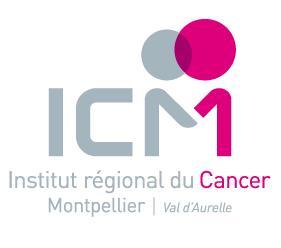Hypnosis on patients treated with adjuvant chemotherapy for breast cancer: A feasibility study
Résumé
Background Acceptability and tolerance of chemotherapy on patients treated for breast cancer remain challenging. Complementary approaches such as hypnosis may have a favorable impact both at the time of announcing and during chemotherapy, due to the notorious anxiety, distress, and self‐perceived dysfunction. The objective of the study was that the patients complied with at least four self‐hypnosis sessions out of the six cycles of chemotherapy. Methods This open, prospective longitudinal study assessed feasibility of compliance to self‐hypnosis during chemotherapy in an outpatients setting. Training sessions were given by a hypnotherapist. Throughout each cycle of chemotherapy, the patient had to use self‐hypnosis to better control her anxiety or any difficulties. Nurses could offer help to the patient. Chemotherapy‐associated side effects were evaluated through the NCI‐Common Toxicity Criteria for Adverse Events v 4.03; moreover, side effects as pain, nausea, vomiting, fatigue, and anxiety were also evaluated during chemotherapy using a visual analogic scale. Health‐related quality of life, emotional distress (anxiety and depression), and cancer‐related fatigue were assessed (at inclusion, end of chemotherapy and 3 months later) using the EORTC QLQ‐C30 and QLQ‐BR23, HADS and MFI‐20 questionnaires, respectively. The number of patients screened and actually included in the study was reported, as the reasons for refusal. Results Thirty‐five patients were included with a median age of 55 years (35–78). All patients received a hypnosis training session. The overall compliance with self‐hypnosis was 68.6% (95% CI: 50.7%–83.2%), meaning that more than two thirds of patients performed at least four sessions of self‐hypnosis. According to NCI‐CTCAE, Grade 2 nausea and vomiting was observed in 45.7% and 22.9%, respectively, Grade 2 fatigue in 62.9%. Based on the HADS questionnaire, anxiety increased at the end of the chemotherapy and returned to the initial value 3 months later ( p = .97) whereas depression significantly decrease 3 months after the end of chemotherapy with respect to the inclusion ( p = .003). Role, emotional, and cognitive functioning were slightly affected throughout the treatment, in contrast to dyspnea or physical functioning. Conclusion Our study showed that self‐hypnosis was feasible on patients newly diagnosed for breast cancer receiving chemotherapy.
Domaines
Cancer| Origine | Fichiers éditeurs autorisés sur une archive ouverte |
|---|---|
| licence |



